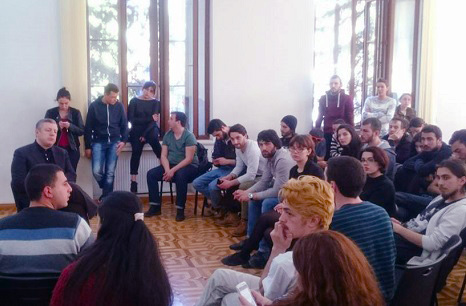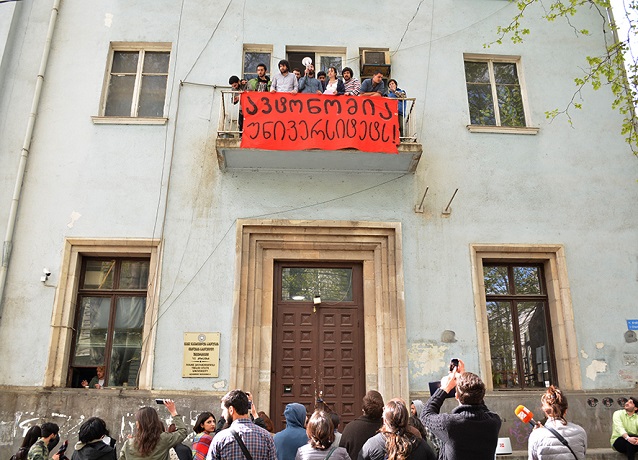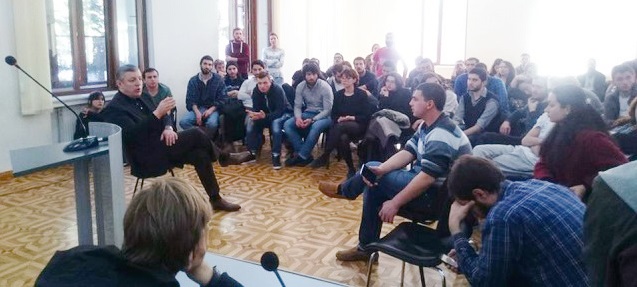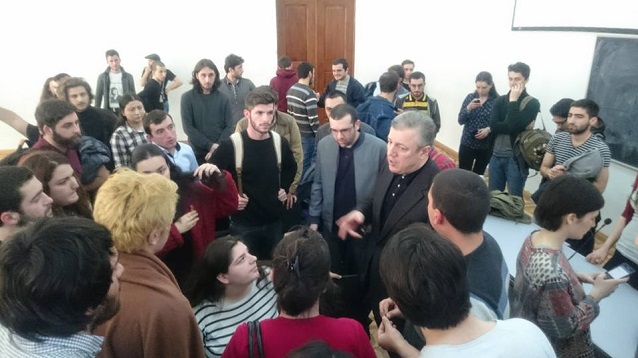Unrest ends at TSU after PM Kvirikashvili meets protesting students

After two days of revived student unrest at Ivane Javakhishvili Tbilisi State University (TSU) in Georgia’s capital, peace has returned to the tertiary institution after Prime Minister Giorgi Kvirikashvili met students who had blockaded themselves in a building.
A group of students resumed their protest at the University on April 16 as they believed an agreement made last month with the Ministry of Education would not be fulfilled.
The students picketed one of the TSU buildings in central Tbilisi, locked themselves in and refused to let anyone inside, and demanded to meet with the Prime Minister to communicate their demands with him.

Photo: netgazeti.ge
Last night PM Kvirikashvili arrived at the University and asked his guards and nearby journalists to vacate the area so he could talk with the youth face-to-face, alone. He and the students used an underpass to reach another building of the university where the meeting took place.

After the meeting the students ended their protest, opened the door of the picketed building and allowed teaching to resume this morning.
"Most of the students’ requests are deep from heart and are very necessary,” said Kvirikashvili after meeting the students. He said he listened to their demands carefully and spoke with them for a long time.
"We agreed that the student self-government should not exist in its current ugly manner,” Kvirikashvili said.
The PM and students agreed they would meet again before the end of this week to discuss details of how to change the form of the current student self-government. A special working group of students will be set up to cooperate with the PM in person. The group and the PM will be involved in the process of developing a new education law.

Students believed education had never been the country’s top priority and they wanted to change this, for which they said a systemic education reform was needed.
Kvirikashvili said this was a very sensitive issue and the state would work on it together with the students.
After meeting with Kvirikashvili, the protesting students said they trusted the Prime Minister and believed he would keep his word and ended their protest. They let the University Administration and journalists enter the building to prove nothing had been broken or damaged during the two days they had occupied the building.
Student unrest began at TSU in early March when one group of students who called themselves Auditorium 115, protested against the only proposed candidate for the post of University Chancellor. The students said candidate Giorgi Gaprindashvili was unfit for the post due to his past actions and his eager cooperation with a Ministry of Internal Affairs ‘spy’ at TSU.
Gaprindashvili, who previously served in the TSU Student’s Government (Tvitmmartveloba), dismissed Auditorium 115’s accusations about misspending Tvitmmartveloba funds, abuse of students and cooperating with the Interior Ministry representative.
Shortly after the conflict began PM Kvirikashvili appealed to Gaprindashvili to remove his nomination so peace could be restored at the University. Initially Gaprindashvili resisted but on March 14 he announced he had removed his name from the race.
This however triggered a protest within another group of students, mainly united in Tvitmmartveloba, who supported Gaprindashvili. Tvitmmartveloba demanded the resignation of University Rector Vladimer Papava, and accused him of opposing Gaprindashvili’s candidacy for University Chancellor.
Meanwhile to counter this, the initial protesting students within Auditorium 115 and the majority of lecturers did not agree Papava should resign.
Papava confirmed he would not step down but later he announced his resignation. Until now he maintains his role but says he will resign next month.
Meanwhile after more than a week of protests, counter-protests and accusations from both protesting sides, the opposing students came to an agreement in mid-March.
Two rival groups of students reached a consensus about the need of a systemic reform of TSU. Both parties appealed to the Government to carry out a complete reform and remove the Ministry of Internal Affairs ‘spies’ from the education institution.
In order for a deal to be reached, the students demanded the University leadership and the Ministry of Education sign a special agreement in the coming days about a "long-lasting cooperation” in the reform process.
If the Government failed to begin genuine efforts to address problematic issues at the University by April 16 this year, the students threated they would carry out major demonstrations.
 Tweet
Tweet  Share
Share